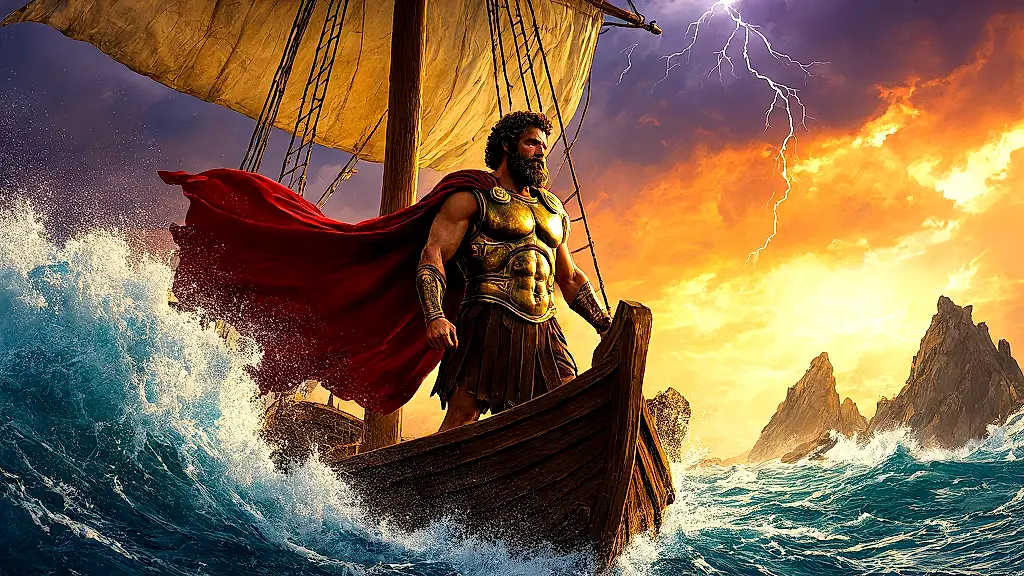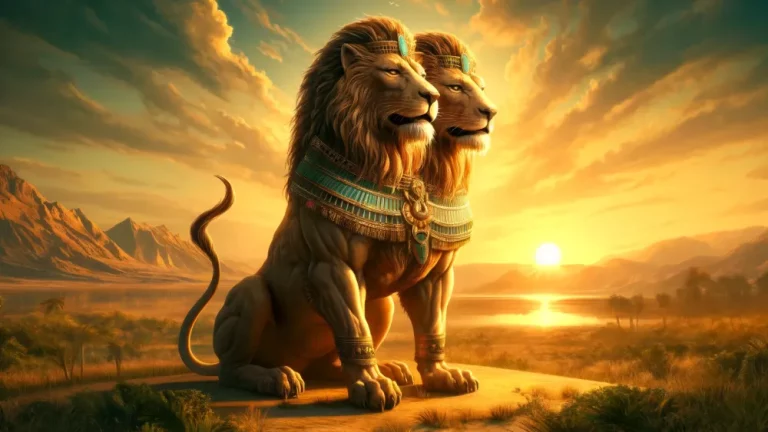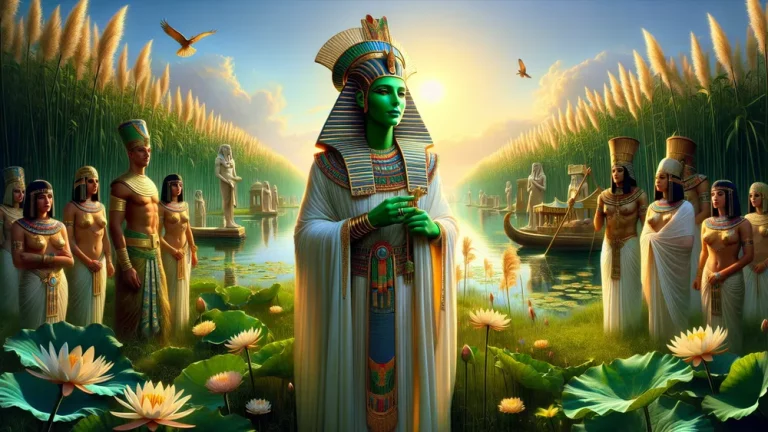Ulysses In Greek Mythology: The Heroic Journey Of Odysseus
Odysseus is called Ulysses in Roman mythology. He’s one of Greek myth’s most resourceful heroes, famous for his part in the Trojan War and his 10-year struggle to return home in Homer’s Odyssey. Imagine a traveler stuck in endless delays, but instead of airports, he faces Cyclopes, sorceresses, and angry gods. He was born to King Laertes and Anticlea in Ithaca. His life was shaped by prophecies of hardship, which followed him everywhere.
Key Points:
- Odysseus, also called Ulysses in Roman myths, was a clever Greek hero known for his long trip home after the Trojan War.
- He tricked the Trojans with the wooden horse idea, which helped the Greeks win the war.
- His journey home took 10 years, facing monsters like the Cyclops Polyphemus and dangers like the Sirens and Scylla.
- Athena helped him a lot, but Poseidon made his trip harder after Odysseus hurt his son, the Cyclops.
- When he finally got back to Ithaca, he disguised himself as a beggar to test who was loyal before taking revenge on the suitors.
- The story teaches about smart thinking, patience, and the struggles of coming home after a long time away.
- His adventures left a big mark, with words like odyssey now meaning a long, tough journey.
The Odyssey isn’t just about survival. It’s a perfect example of metis, or strategic intelligence, a skill that defines him. Homer’s version is the most famous, but Roman writers like Virgil later retold his story. That’s why he’s also called Ulysses. Let’s dive into his adventures – from the Trojan Horse trick to outsmarting Polyphemus – and see why his legacy still matters.
Ulysses In Greek Mythology: Overview and Key Facts
| Category | Details | Notes |
|---|---|---|
| Name(s) | Greek: Odysseus<br>Roman: Ulysses | Roman writers, like Virgil in the Aeneid, made him less aggressive than in Greek myths. |
| Role | King of Ithaca, Greek hero of the Trojan War, protagonist of the Odyssey | He led with cunning intelligence (metis) and a drive for glory in battle (kleos). |
| Key Traits | * Eloquence (e.g., convincing Achilles to join the war)<br>* Resourcefulness (e.g., using disguises in Odyssey)<br>* Flaws: Pride (e.g., taunting Polyphemus) | He was highly strategic but sometimes let pride override caution. |
| Symbols | * Bow (unstringing contest in Ithaca)<br>* Olive-wood bed (symbolizing marital loyalty)<br>* Ship (endurance) | These objects play important roles in key stories. |
| Divine Allies | * Athena (main supporter, helps with strategy and disguises)<br>* Hermes (gives moly herb to resist Circe) | However, Poseidon hated him for blinding Polyphemus, which offset their support. |
| Major Myths | * Trojan Horse (see “Trojan War” section)<br>* Odyssey trials (e.g., Cyclops, Sirens)<br>* Revenge on suitors | Later poets, like Sophocles, added new stories, including his death. |
| Cultural Impact | * Archetype of the “clever hero”<br>* Represents nostos, the idea of homecoming<br>* Inspires modern terms (“odyssey” for long journeys) | His strategic mind sets him apart from warriors like Achilles. |
| Ambiguities | * Parentage: Some myths say Sisyphus, not Laertes, was his father.<br>* After the Odyssey: The Telegony claims his son Telegonus killed him. | Different versions exist across regions and time periods. |
Odysseus’ Backstory
Odysseus was famous for his cunning and resilience, but to truly understand these traits, we should first examine where he came from and his early years.
Birth and Family
Odysseus was born to Laertes, king of the rocky island Ithaca, and Anticlea, daughter of the crafty thief Autolycus (who was Hermes’ son). While Homer says Laertes was his father, other writers like Sophocles claimed Sisyphus was his real father because of Anticlea’s relationship before marriage – these contradictions happen often in Greek myths.
His royal status came with a troubling prophecy, delivered either at birth or by the seer Halitherses, saying he’d face decades of struggle before coming home. He inherited a small but important kingdom, though he would later lose it temporarily to suitors.
From his grandfather Autolycus, whose name translates to “the wolf,” Odysseus got his guile – a trait that helped him during the Trojan War and against the Cyclopes.
Odysseus was born a prince of Ithaca and inherited cleverness from his thief grandfather, but a prophecy warned he’d suffer long before returning home.
Young Odysseus: Adventures and Traits
Odysseus showed his cleverness and ability to negotiate early on. During the Calydonian Boar hunt – an important event for young Greek nobles – he got a distinctive leg scar that later helped identify him. Some stories say he didn’t even want to join the hunt. His smartest early move was creating the Oath of Tyndareus, where all of Helen’s suitors promised to protect her future husband.
This became ancient Greece’s most important marriage agreement, which later forced the Greeks to unite against Troy. When trying to win Penelope, he showed xenia (the sacred rules of hospitality) by competing fairly for her hand. Different stories say he won either by running the fastest or by outthinking the other suitors.
These experiences developed his key qualities: planning ahead (with the Oath), physical toughness (from the scar), and determined patience (in winning Penelope). All these skills would prove vital during his later adventures.
Odysseus in the Trojan War
The same cleverness from Odysseus’ younger years proved most valuable during Greece’s war against Troy. His planning skills ultimately altered the outcome of the ten-year conflict.
The Cleary Warrior and His Tricks
When first called to fight in the Trojan War, Odysseus tried to avoid being drafted by pretending to be insane. He plowed fields using a mismatched donkey and ox team, scattering salt instead of seeds. Palamedes caught him by placing baby Telemachus in the plow’s path – some stories say he threw the child. Once forced to join, Odysseus’s clever mind became crucial.
He planned the risky operation to Skyros where, dressed as a trader, he found Achilles hiding among the king’s daughters. Odysseus placed weapons with women’s jewelry, and Achilles immediately grabbed them. These early war moves earned Odysseus the title polytropos (“man of many tricks”) from Homer. This established him as the Greeks’ top strategist, which would later lead to his most famous trick of the war.
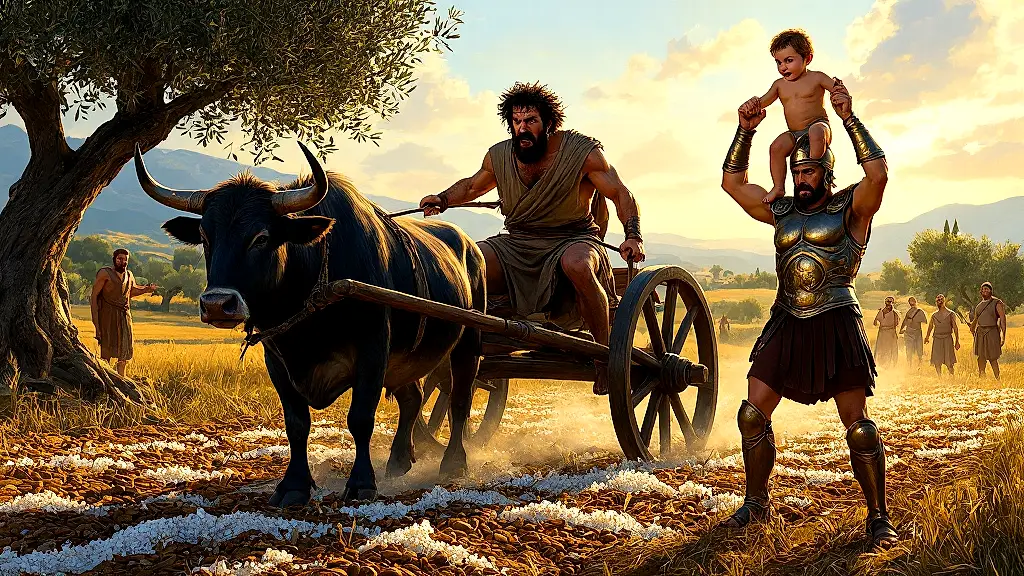
The Trojan Horse Trick
Odysseus’s greatest trick came in the war’s tenth year with the legendary Trojan Horse, a gift that looked harmless but hid Greek soldiers inside. Some stories say Athena gave him the idea, but everyone agrees Odysseus planned the deception.
- Greek retreat: First, the army pretended to sail away. They left only Sinon, who told a believable story about the horse being a peace offering to Athena.
- Construction: Epeius built it from Mount Ida’s pines. The huge size forced the Trojans to break their own city walls to bring it in.
- Warrior selection: Odysseus chose the best fighters, including himself and Neoptolemus, who waited silently inside.
- Night attack: When night fell after Troy’s celebration, the Greeks came out and opened the gates for their returning army.
The trick used human nature perfectly.
Even when Laocoön said “I fear Greeks bearing gifts” and Cassandra predicted disaster, the Trojans wanted so badly to believe they’d won that they ignored the warnings. This led directly to the city’s fall.
The Odyssey: Challenges and Struggles
The Greeks won at Troy thanks to Odysseus’s smart thinking. But his trip home to Ithaca would put his cleverness and strength to the test more than anything before, as angry gods and dangerous monsters blocked his way.
Polyphemus the Cyclops
Odysseus’s meeting with one-eyed Polyphemus in Book 9 of the Odyssey would test his survival skills like never before. The giant trapped them in his cave and started devouring his men two at a time. Odysseus came up with a smart escape plan:
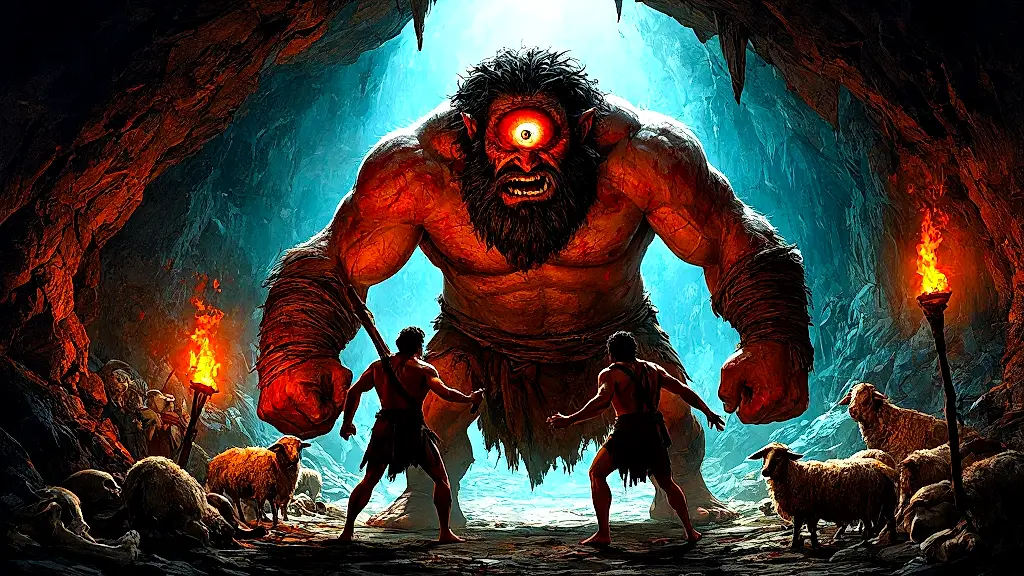
- False identity: First, he told the Cyclops his name was “Nobody.” When Polyphemus later yelled “Nobody is hurting me,” the other Cyclopes ignored him.
- Strategic intoxication: He gave the monster undiluted wine (normally mixed with water) to get the giant drunk.
- Blinding operation: While Polyphemus slept, Odysseus used a heated olive-wood stake to destroy his single eye.
They escaped by clinging to sheep’s bellies. But when Odysseus shouted his real name, the blinded Cyclops asked his father Poseidon for revenge. This caused years of Poseidon’s curse and trouble for Odysseus.
Odysseus tricked the Cyclops by calling himself Nobody, got him drunk, blinded him, and escaped by hiding under sheep, but his pride made him reveal his real name, bringing Poseidon’s wrath.
Circe’s Magic and Help
On the island of Aeaea, the sorceress Circe (daughter of Helios) used her golden wand and a magic potion to turn Odysseus’s scouting party into pigs. Only Eurylochus escaped this fate because he stayed outside. Hermes warned Odysseus and gave him moly, a magical plant with black roots and white flowers. With its protection, Odysseus resisted Circe’s spells and forced her to change his men back.
This led to them staying on the island for a year, where the crew enjoyed comfortable living while Odysseus became Circe’s lover. Before they left, Circe gave important advice. She told Odysseus to sail to the house of Hades, where the blind prophet Tiresias could offer guidance through Tiresias’ prophecy.
But she warned this voyage would take them to places no living man had gone before.
The Underworld and Tiresias’ Warning
He followed Circe’s instructions and conducted a special ritual to summon the dead. Odysseus dug a trench and poured in milk, honey, wine, water, and barley. Then he performed the black sheep sacrifice, letting their blood flow into the trench to briefly bring the spirits back to awareness. The blind prophet Tiresias appeared, still clutching his golden staff.
He warned Odysseus would only reach Ithaca if he stopped his men from eating Helios’ sacred cattle on Thrinacia. The prophet also foretold trouble waiting at home, with suitors overrunning his palace. Among the spirits that drank the blood, Odysseus’ mother Anticlea explained she had died from grief while he was away.
Most strikingly, Achilles appeared and said he would rather be a lowly slave alive than rule as king of the dead.
Sirens, Scylla, and Charybdis
Odysseus faced one of the most dangerous stretches of sea, using Circe’s tips to pass between the singing Sirens and two deadly monsters. The Sirens’ enchanting songs promised secret knowledge that lured sailors to their deaths. On the other side waited Scylla, a six-headed beast that would grab men right off the ship, and Charybdis, whose whirling waters could suck down whole vessels.
To deal with this, he sealed his crew’s ears with beeswax earplugs but had himself tied to the mast to hear the Sirens safely. This clever plan let him experience their forbidden song without danger. When forced to choose between the monsters, Odysseus picked Scylla over Charybdis. The decision cost him six crew members, but saved the ship from total destruction.
He later said their screams were the worst thing he’d witnessed in all his travels.
Helios’ Cattle and the Gods’ Anger
Storms forced Odysseus’ crew to stay on Thrinacia, Helios’ sacred island, for a month. They got so hungry they stopped thinking straight and killed the sacred cattle while Odysseus was sleeping. These were special animals – immortal and never having calves. They made things worse by roasting the meat, which was only meant for special offerings to the gods.
The crew knew they’d done wrong when they saw the hides moving and heard the meat mooing on their spits. When Helios found out, he threatened to leave the world of the living unless Zeus punished them. The divine punishment came as they sailed away – Zeus blasted their ship with a thunderbolt. Everyone died except Odysseus, who hung onto pieces of the ship for nine days before reaching Calypso’s island.
This disaster proved Tiresias’ prophecy right and showed how seriously the gods took violations of their property.
Odysseus’ starving men killed Helios’ sacred cattle, angering the gods so much that Zeus destroyed their ship, leaving only Odysseus alive.
The Gods: Friends and Foes
Odysseus survived this far because he handled both physical dangers and the divine favor of certain gods. But he also faced their godly wrath, which made his journey much harder. Now we’ll see how the gods became his strongest helpers at times, and his most powerful opponents at others. Their actions directly affected every step of his travels home.
Athena: His Guardian and Guide
Athena helped Odysseus through all his struggles, showing how well human cleverness could work with divine help. As the goddess of battle tactics, she admired Odysseus’ wisdom and stepped in when needed most. She appeared in different forms to assist him. As Mentes, she encouraged Telemachus. Later, she guided Odysseus home by looking like a shepherd. Before important fights, she made him look stronger and taller.
Here are her main acts of help:
| Intervention Form | Specific Example | Book Reference |
|---|---|---|
| Disguise | Appears as Mentor to advise Telemachus | Odyssey 2 |
| Divine Inspiration | Guides Odysseus’ spear during suitor battle | Odyssey 22 |
| Strategic Advice | Warns about Poseidon’s wrath after Polyphemus | Odyssey 13 |
| Physical Enhancement | Makes Odysseus appear taller/more handsome | Odyssey 6 |
Athena also protected the sacred rules of hospitality that the suitors broke. This made Odysseus’ revenge right in the gods’ eyes. While she couldn’t stop Poseidon’s anger, her careful actions created chances for Odysseus to succeed. She planned each move like a skilled commander in battle.
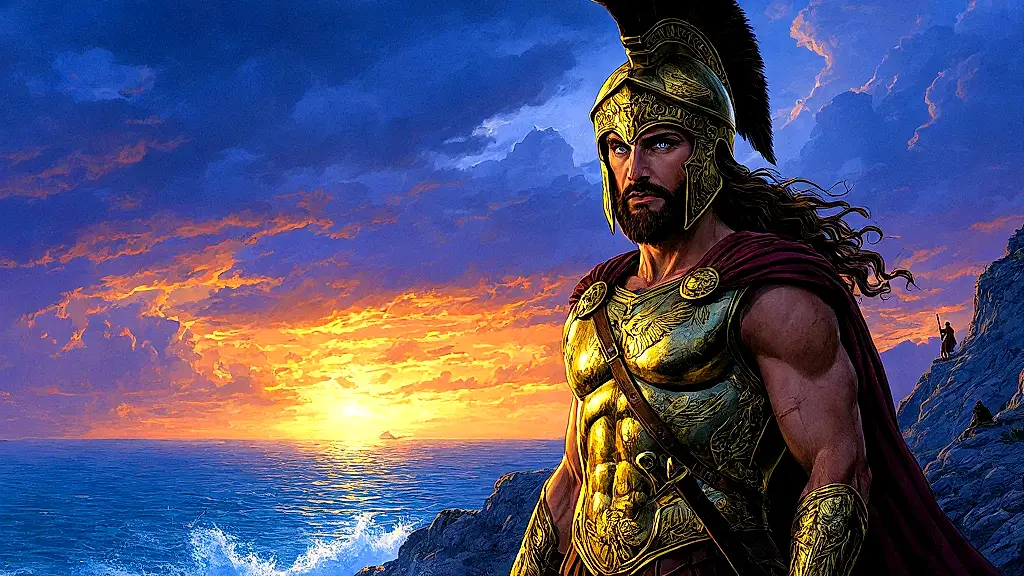
Poseidon: His Biggest Enemy
Poseidon, the earth-shaker, turned into Odysseus’ worst enemy among the gods after Odysseus blinded his son Polyphemus. The sea god used his power over the ocean to make the trip home take ten extra years. He created terrible storms that destroyed ships, like the one after Odysseus left Calypso’s island. Poseidon also blocked safe harbors, forcing Odysseus to wander the vast sea with no way home.
The sea god’s anger showed in the curse he put on Odysseus: “Let him lose all companions and return under strange sail to bitter days at home.” This powerful curse worked like magic, continuing even when Zeus tried to help. Only in Book 13 did Athena finally arrange a solution. The whole conflict shows the Greek honor rules, where hurting a god’s child brought extreme punishment, no matter the reason.
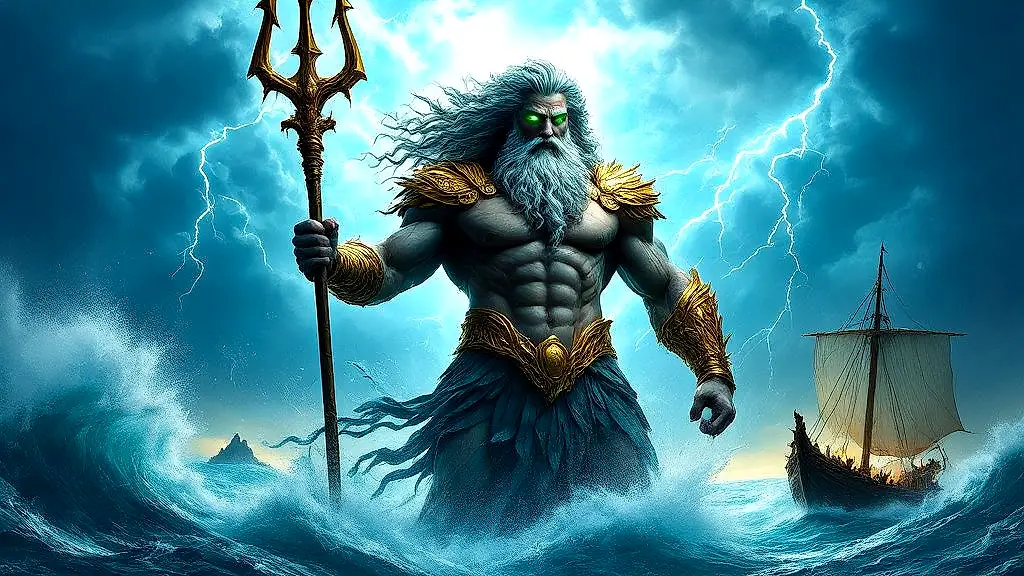
Coming Home and Taking Revenge
When Poseidon’s anger finally calmed, Odysseus could finally go back to Ithaca. But his homecoming brought one final challenge that would test both his smarts and power. Instead of a hero’s welcome, he had to face his enemies. Many had wronged his family while he was away, and now he would confront them all.
Return in Disguise
When clever Odysseus reached Ithaca, Athena turned him into a ragged beggar. This complete transformation gave him the ideal disguise to check on his kingdom without the suitors noticing. The disguise helped in several important ways. First, it let him test xenia (the sacred guest-host bond) when he stayed with Eumaeus the swineherd.
He could also watch the suitors’ behavior up close while slowly showing his true identity to trusted friends. Athena didn’t just change his clothes – she created a complete transformation. She wrinkled his skin, thinned his hair, and made his bright eyes dull. The change worked so well that even his wife Penelope didn’t recognize him. In Greek society, beggars had special meaning.
They were the lowest class but also protected by the gods under hospitality laws. This forced the suitors to put up with his presence while he gathered information for his revenge.
Meeting His Son Again
At Eumaeus‘ hut, Athena arranged an important scene where Odysseus revealed himself to Telemachus. First she made sure Telemachus returned safely from Sparta by warning him about the suitors’ ambush. Then she temporarily removed Odysseus’ beggar disguise so father and son could recognize each other, though she quickly restored his secret identity to keep their advantage. This wasn’t just an emotional moment.
Odysseus immediately started planning how they would fight back against the suitors. He tested his son’s judgment by asking “What if I were Odysseus?” before proving who he was by describing their family’s olive-wood bed. The scene shows the Greek value of family honor – how father and son needed to work together to restore their household’s dignity.
Their reunion mattered most because it let them plan their next moves, not just because they were happy to see each other.
The Archery Contest and Suitors’ Doom
Penelope set up the final challenge – a bow contest that became Odysseus’ perfect trap. None of the suitors could string his massive bow, a weapon only he could use after twenty years of war and travel. When the disguised king easily strung it and shot an arrow through twelve axe-heads, he showed he was in complete control. Then he revealed himself and began his revenge with Apollo’s blessing.
The attack that followed was carefully organized:
- First, Odysseus, Telemachus, and two loyal servants blocked all exits
- With Athena’s help, their spears never missed while the suitors’ weapons failed
- Each death mattered, matching specific wrongs done to the household
This violence matched several predictions, including Tiresias’ warning in the Underworld and Zeus’ thunder that showed the gods approved. Athena appeared as Mentor during the fight, changing it from a normal battle to one involving gods. She guided Odysseus’ spear throws and made sure no suitor escaped.
Odysseus proved he was the true king by effortlessly stringing his bow and killing the suitors with help from Athena, fulfilling earlier prophecies about his revenge.
The Enduring Legacy of Odysseus
Odysseus’ adventures created the model of the clever hero whose smart solutions beat physical power. He created a pattern that still influences how we tell stories today. His name came to mean strategic thinking (the “Odyssean” approach) and difficult journeys (the word “odyssey”).
Not only did his story give us these terms, but his successes and failures still make people discuss leadership, determination, and complicated choices. From ancient poems to modern psychology, Odysseus shows us how intelligence can overcome challenges, leaving a lasting influence on both language and modern discussions about heroism.
FAQs
1. Why is Odysseus called Ulysses?
Odysseus is called Ulysses due to the Roman adaptation of his Greek name (Ὀδυσσεύς) into Latin as “Ulixes” or “Ulysses.”
2. How long was Odysseus’ journey home?
Odysseus’ journey home lasted 20 years, including 10 years fighting in the Trojan War and 10 years of wandering.
3. Which gods aided or hindered Odysseus?
The gods who aided or hindered Odysseus included Athena and Hermes as allies, while Poseidon relentlessly opposed him.
4. What happened to Odysseus after the Odyssey?
After the Odyssey, Odysseus was killed by Telegonus, his son with Circe, and buried at sea.

